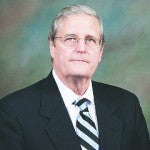NC primary elections come early
Published 5:46 pm Tuesday, November 24, 2015
The North Carolina Primary Election takes place March 15, 2016. This move is intended to increase North Carolina’s influence in presidential elections. The last primary involving the presidency was held on May 8, 2012. Even with the changed date, 13 states have earlier primaries and four have the same date. This moves us from the back of the pack to closer to the front. How much increased influence this will give North Carolina, if any, I don’t know. Most of the weaker candidates will be wiped out before it reaches North Carolina. If is still competitive, we will have a say.
Sixteen states have closed primaries. In those states, a registered voter may only vote in their respective party’s primary election. Nineteen states have open primaries. A registered voter may vote in the party primary of their choice.
North Carolina is a closed primary state with special provisions. A registered Democrat or Republican may only vote in the party they are registered in, but unaffiliated voters may select the party primary they chose to vote in. In the past, unaffiliated voters have been known to select a primary based on a candidate they like and would like to see elected.
How does this affect the primary? According to the NC State Board of Elections, 41 percent of registered voters are Democrats, 30 percent Republican and 28 percent unaffiliated. Unaffiliated voters have a major impact in primary elections. By March 15, it is likely that Hillary Clinton will already have been selected as the Democrat candidate. If this occurs, more unaffiliated voters may be participating in the Republican primary for the sole purpose of helping select the Republican presidential candidate.
How does the early primary date affect local and state political races? Filing for office is much earlier; it runs from Tuesday, Dec. 1 through Monday, Dec. 21. Once the March 15 primary is over, candidates have an extremely long campaign period until the November general election.
Thus far, I have not heard much about who is running for what this year. We know State Representative Paul Tine, District 6, is not running and assume there will be competitive primary races, Republican and Democrat. Dare County has more registered voters in the district than Beaufort County and may have the advantage unless we have a real strong candidate from Beaufort County. District 1 NC State Senator Bill Cook and District 3 NC State Representative Michael Speciale are also up for reelection if they chose to run.
Normally, I hear a lot of noise about who is running for Beaufort County commissioner but have heard little thus far. With filing starting Dec. 1, potential candidates may not have thought about it much. If a potential candidate is unaffiliated and desires to register as a Republican or Democrat, it is already too late to change voter registration. The only way to run for county commissioner as an unaffiliated candidate is through a petition that must be signed by 4 percent of the registered voters in Beaufort County. This equals approximately 1,280 signatures.
There are four seats being contested for Beaufort County commissioner. They are held by Robert Belcher, Gary Brinn, Jerry Langley and Hood Richardson. Normally, most incumbents run for reelection. I expect there will be other candidates, but the early primary season may have some effect. It will be interesting to see who does sign up and where they come from. Last election, Beaufort County had their first commissioner elected from the eastern part of the county since Robert Cayton. I do predict there will be a candidate from the eastern part of the county but have no idea who it will be.
Other Beaufort County offices contested in 2016 include races for school board, Register of Deeds, and Soil and Water Conservation District Supervisor. School Board and Water Conservation are nonpartisan races. Any registered voter may file and run in the general election in November.
I believe the Beaufort County School Board races could be interesting. Unlike the one-vote system for electing county commissioner, each school board member represents 1 of 9 districts: District 1, Eltha Booth; District 3, Barbara Boyd-Williams; and District 9, Mike Isbell, ran unopposed in 2012. District 5, Mac Hodges and District 7, Carolyn Walker, had competitive races. I’m hopeful there will be more competitive races for school board this election.
Being an interested citizen, I am looking forward to an interesting election season. It’s going to be a long one.
Al Klemm is a retired Beaufort County Commissioner.






